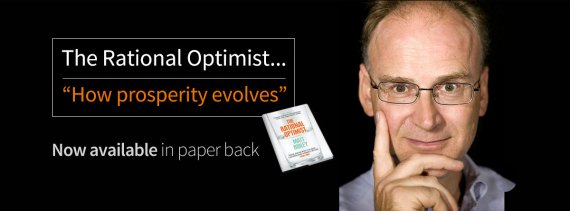The British Ridley is the author of books on genetics, evolution and society. One of his books, The Rational Optimist, contains an argument on how well humanity is doing. There is no reason whatsoever to be pessimistic. Our lives are better than those of our predecessors on the planet in every sense. The ever-accelerating development of science plays an important part in this. On the eve of Ridley’s visit, Resource asked him several questions – online –pertaining his optimism. This was still before the protests against the choice of Ridley as a keynote speaker started among a few of the Wageningen professors and scientists.
In your books, you argue that cooperation and trade have greatly helped humanity to develop. However, this success does not guarantee future results. Is being so optimistic not naive considering threats such as climate change, overpopulation, depletion of natural resources and terrorism?
‘We could certainly achieve calamity with the wrong policies – ones that reduce cooperation and exchange. But equally, it must be taken into account that previous predictions of calamity have nearly always been wide of the mark. In the case of population, we were repeatedly told in the 1960s and 1970s that the population “explosion” was unstoppable and required drastic and inhumane actions. In fact, since then the rate of increase has halved and we are on course to see world population cease growing by the end of this century, after not even doubling during this century when it quadrupled in the 20th century. This largely happened despite coercion not because of it. The main cause was the decline in infant mortality (a very good thing in itself), which causes people to plan smaller families.
There is every reason to expect technologies for decarbonisation and for adaptation to be able to solve the problem
Matt Ridley
In the case of climate change, there is a possibility of catastrophe, but there are three reasons for expecting that it may not be bad: a) warming has happened roughly half as fast in the past 33 years as predicted, and there has been no increase in drought and storms, while any increase in floods is down to land-use changes, not climate change; b) current estimates of climate sensitivity have come down substantially, which indicates that dangerous warming is unlikely before the 22nd century – absent absurd assumptions about a return to coal burning (the RCP8.5 scenario of the IPCC); c) by then, there is every reason to expect technologies for decarbonisation, and for adaptation, to be able to solve the problem, especially given how much richer the world will have become.
 *Also, we now know that carbon dioxide is causing a significant greening of the globe – equivalent to two new continents of green vegetation the size of the mainland USA in 30 years. It is important to remember that pessimism is not a cost-free policy. Terrible harm has been done to millions of people in the name of fighting population growth and climate change over the past few decades: by compulsory sterilisation in India and China, by biofuels, by the refusal to fund the cheapest forms of electricity for Africa (where millions die each year because of having to cook over wood fires)
*Also, we now know that carbon dioxide is causing a significant greening of the globe – equivalent to two new continents of green vegetation the size of the mainland USA in 30 years. It is important to remember that pessimism is not a cost-free policy. Terrible harm has been done to millions of people in the name of fighting population growth and climate change over the past few decades: by compulsory sterilisation in India and China, by biofuels, by the refusal to fund the cheapest forms of electricity for Africa (where millions die each year because of having to cook over wood fires)
.*
There is no sign of exhaustion of minerals. Indeed they are generally getting cheaper thanks to new technologies for extracting them and recycling them. We will cease using coal long before it runs out for example. Renewable resources like whales do run out easily, but we are increasingly good at reversing this. And we have survived terrorism many times before, from anarchists a century ago, to Red Brigades to the IRA, difficult though the problem is.’
You believe in progress. How do science and technology fit in this belief?
‘There is no doubt that technology and science progress, in the sense that new knowledge is added to old knowledge in a cumulative way. That process – innovation – is responsible for the extraordinary improvement in human living standards over recent decades, to the point where just 9% of people are living in extreme poverty, down from 70% when I was born. This is progress in itself, but it has been accompanied by an increase in health, happiness, education, freedom, and a decline in pollution, violence and inequality. The world is rapidly growing more equal today, because people in poor countries are getting richer faster than people in rich countries. I do not “believe” in progress – that is the wrong word. I see evidence of progress. That is a big difference.’
Is your optimism founded on the theory of evolution, in that organisms – including humanity – will always find a way to adapt to an ever-changing environment?
‘My book The Evolution of Everything tackles the question of why it is that good progress has outpaced bad regress in the past few decades and concludes that it is an evolutionary process: gradual, undirected, driven by trial and error and organic. To put it another way, good things are gradual and come from below, bad things are sudden and come from above – from “leaders”. This is not always true, but surprisingly often.’

